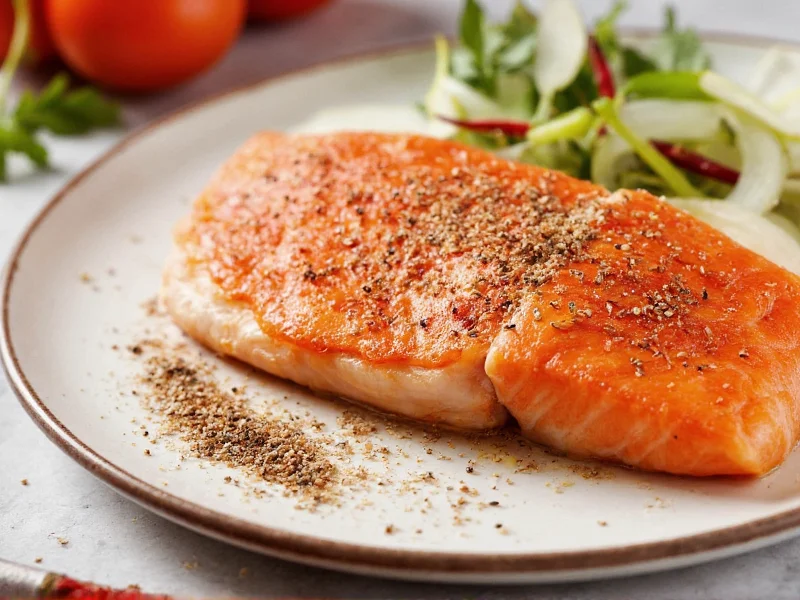Choosing the right seasonings transforms ordinary fish into a culinary delight. Proper seasoning enhances natural flavors without overwhelming the delicate texture that makes fish special. Understanding which seasonings complement different fish varieties ensures your dishes achieve restaurant-quality results at home.
Essential Seasoning Principles for Fish
Fish requires thoughtful seasoning due to its delicate nature. Unlike heartier meats, fish absorbs flavors quickly but can easily become overpowered. The key is balancing enhancement with restraint. Acidic elements like citrus help neutralize any potential fishiness, while herbs add complexity without masking the main ingredient.
Top Seasoning Options and Their Applications
Certain seasonings consistently deliver exceptional results with fish. Understanding their flavor profiles helps you make informed choices for your specific recipe and fish type.
Salt and Pepper: The Essential Foundation
Never underestimate the power of properly applied salt and freshly cracked pepper. Salt draws out moisture initially but then helps proteins reabsorb it, creating a more succulent texture. Apply salt 15-20 minutes before cooking to allow proper absorption. Coarse sea salt works particularly well for creating a light crust on grilled or pan-seared fish.
Citrus Elements: Lemon, Lime, and Beyond
Citrus brightens fish dishes while cutting through any potential fishiness. Lemon zest provides more intense flavor than juice alone, as the oils contain concentrated citrus essence. For best results, add citrus zest before cooking and fresh juice after cooking to preserve its vibrant flavor. Different citrus varieties work with specific fish types:
| Citrus Type | Best Fish Pairings | Application Tip |
|---|---|---|
| Lemon | Salmon, trout, cod | Add zest before cooking, juice after |
| Lime | Tilapia, snapper, mahi-mahi | Use in marinades with cilantro |
| Orange | Salmon, sea bass | Combine with fennel for Mediterranean dishes |
| Grapefruit | Arctic char, halibut | Add segments as finishing garnish |
Fresh Herbs: Elevating Flavor Profiles
Fresh herbs provide aromatic complexity that dried versions can't match. Delicate fish like sole or flounder work best with subtle herbs like dill and parsley, while robust fish like salmon can handle stronger flavors like rosemary and thyme.
Dill creates a classic pairing with salmon and other oily fish. Its slightly sweet, grassy notes complement without overpowering. Try mixing chopped dill with lemon zest and olive oil for a simple but elegant finishing sauce.
Parsley offers versatility across nearly all fish varieties. Flat-leaf (Italian) parsley provides more flavor than curly varieties. Combine with garlic and lemon for a universal fish seasoning blend that works for baking, grilling, or pan-searing.
Tarragon delivers a distinctive anise-like flavor that pairs exceptionally well with white fish like cod or haddock. Use sparingly as its flavor can dominate. French cuisine often combines tarragon with butter for fish sauces.
Spice Blends for Different Cooking Methods
The best seasoning for fish depends significantly on your cooking technique. Grilling requires different considerations than baking or pan-searing.
For grilling fish, consider these seasoning approaches:
- Smoked paprika creates a subtle smokiness that complements the grill's natural char
- Cajun seasoning works well with firmer fish like swordfish or tuna
- Create a dry rub with equal parts garlic powder, onion powder, and paprika
When baking fish, try these seasoning combinations:
- Mediterranean blend: oregano, thyme, lemon zest, and garlic
- Asian-inspired: ginger, garlic, and a touch of sesame oil
- Simple elegance: dill, lemon, and a sprinkle of flaky sea salt
Regional Seasoning Traditions
Global cuisines offer time-tested seasoning combinations worth exploring. Mediterranean cooking frequently uses lemon and oregano with white fish. Japanese cuisine often employs subtle seasonings like yuzu and shiso that enhance without overwhelming. Latin American preparations might feature cilantro, lime, and chili for ceviche or grilled fish.
Understanding these regional approaches helps you select appropriate seasonings for specific dishes. For example, when preparing fish tacos, a blend of cumin, chili powder, and lime creates authentic flavor. For a French-style preparation, tarragon and parsley form the classic fines herbes combination.
Avoiding Common Seasoning Mistakes
Even experienced cooks make seasoning errors with fish. Over-seasoning remains the most frequent issue, particularly with salt. Remember that fish needs less seasoning than red meat or poultry. Another common mistake involves adding delicate herbs too early in the cooking process, causing them to lose flavor and color.
Timing matters significantly when seasoning fish. Add salt before cooking but incorporate fresh herbs during the last few minutes. Acidic elements like vinegar or citrus juice should typically be added after cooking to preserve their bright flavor. When creating marinades, limit acidic components to 30 minutes or less to prevent the fish from becoming mealy.
Creating Your Own Fish Seasoning Blends
Custom blends allow you to tailor seasonings to your specific taste preferences. Start with a base of salt and pepper, then add complementary elements. For a universal fish seasoning, combine:
- 2 parts sea salt
- 1 part black pepper
- 1 part dried dill
- 1 part lemon zest (dried)
- ½ part garlic powder
This versatile blend works across most fish varieties and cooking methods. Adjust proportions based on your preferences and the specific fish you're preparing. Delicate fish might need less garlic and more lemon, while heartier fish can handle increased garlic and pepper.
Seasoning Fish for Special Dietary Needs
Many seasoning approaches accommodate various dietary requirements. For low-sodium diets, increase use of citrus, vinegar, and fresh herbs to compensate for reduced salt. Those following keto diets can safely use most traditional fish seasonings, as they're naturally low-carb. When preparing fish for children, milder herbs like parsley and chives work better than stronger options like rosemary or oregano.
Understanding how to season fish properly transforms simple ingredients into memorable meals. The best herbs for seasoning fish depend on both the fish variety and your cooking method. How to season fish before cooking involves considering timing, quantity, and complementary flavors. By mastering these principles, you'll consistently create perfectly seasoned fish dishes that highlight rather than mask the natural flavors.











 浙公网安备
33010002000092号
浙公网安备
33010002000092号 浙B2-20120091-4
浙B2-20120091-4